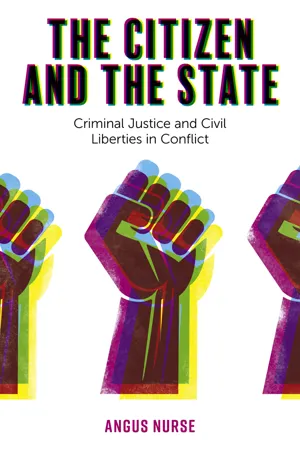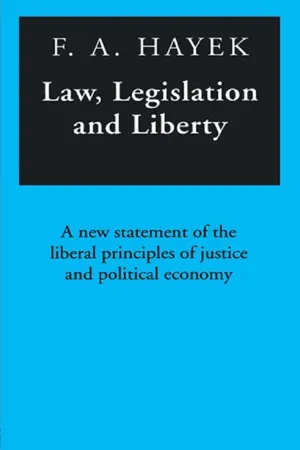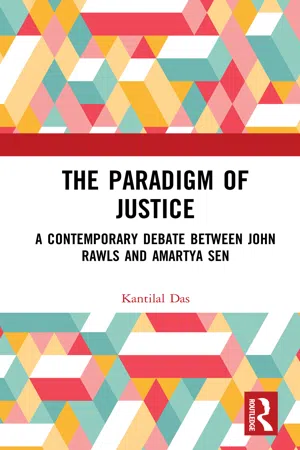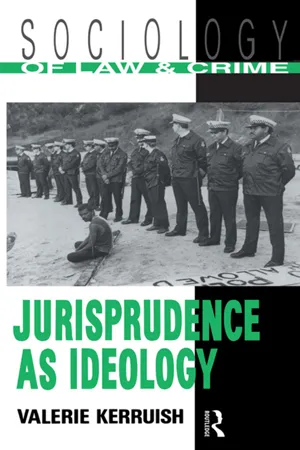Law
Law and Justice
Law and justice are interconnected concepts that aim to maintain order and fairness in society. While law refers to the system of rules and regulations set by a governing authority, justice pertains to the moral and ethical principles of right and wrong, as well as the fair treatment of individuals within the legal system. The pursuit of justice is a fundamental goal of the law.
Written by Perlego with AI-assistance
Related key terms
6 Key excerpts on "Law and Justice"
- eBook - ePub
Modern Jurisprudence
A Philosophical Guide
- Sean Coyle(Author)
- 2022(Publication Date)
- Hart Publishing(Publisher)
1Justice, Law and HistoryT he starting point for this book is a series of questions about the nature of law and its relationship to justice. Scholars and students of law in English-speaking countries, and elsewhere in the world where the English legal tradition has been received, are familiar with the characteristic division between statute and common law. Statute law comprises those written standards and bodies of rules that have been enacted and laid down; whereas the common law, variously described as ‘case law’, ‘judge-made law’ and ‘unwritten law’, forms that part of the legal system in which judges apply, interpret and clarify the law. In carrying out this role, the courts in some sense develop the law, so that a body of doctrine and principle grows up around the enacted rules.Understood in these terms, the relationship of law to justice may already seem tolerably clear: the rules enacted by legislative bodies (even those that are directly and democratically elected) may be fair or unfair; it is the part of the courts in applying the rules to ensure that justice is done by giving effect to them in a measured and balanced way, according to established principles and doctrines such as volenti non fit iniuria, ‘equity will not aid a volunteer’ and so forth. At the same time, the courts are constrained by principles of statutory interpretation to give effect to the written law. Hence, both the general rules of law and the particular decisions of the courts may at times conflict with one’s own sense of what is truly just, or right, and at other times coincide with it.Familiar as it may be, this picture is unsatisfactory in several respects. To begin with, let us consider what it means, in modern times, to be under the governance of law. Used to the peace and prosperity of liberal society, citizens in the West experience law simultaneously in a remote and in a more immediate way. ‘Free’ societies grant a great deal of liberty to individuals to order their lives as seems preferable to them. But those same societies also erect a system of rules, enforceable through official institutions, to govern certain kinds of behaviour: both crimes and civil wrongs. For most people, such laws will seem remote from everyday experience, since it is only when they are transgressed that their importance bears down on one. And how many of us, in our lifetime, find ourselves in the position of a litigant, or in the dock? This sense of remoteness perhaps contributes to the image of Law and Justice described above. - eBook - ePub
The Citizen and the State
Criminal Justice and Civil Liberties in Conflict
- Angus Nurse(Author)
- 2020(Publication Date)
- Emerald Publishing Limited(Publisher)
2 In practice, the rule of law is less a strict rule, and more a set of principles that in the context of this book's discussion about the conflict between criminal justice and human rights articulate the idea that there should be no arbitrary exercise of state criminal justice powers and that any exercise of such powers should have a clear legal basis. These basic ideas of the rule of law also indicate that ideally, there should also be clarity and consistency in the way in which justice powers are exercised such that the logic of any state interference in citizens' lives is clear, and the exercise and administration of justice is fair and consistent. Thus, rule of law principles would provide that where bodies like the police, Ministry of Justice and politicians and criminal justice agencies act unlawfully there should be a mechanism through which they are called to account. Arguably, decisions by Government Ministers and criminal justice agencies are subject to scrutiny by the courts and as chapter three identifies, effective scrutiny is integral to ensuring that abuses of power are resolved. In principle this means that democratic governments will refrain from imposing criminal justice measures that are too draconian because they are aware that these can be subject to challenge in the courts.More complex and contemporary ideas on the rule of law articulate the importance of the content of law and not just the process of the law. Thus, Bingham's eight rules and the principles developed by Raz and the ICJ suggest that principles such as the right to a fair trial and respect for human rights and freedoms require not just principles that are written into the wording of legislation, but that such wording needs to be practically implemented through judicial interpretation that upholds the rule of law. Arguably the UK's Human Rights Act 1998 achieves this by allowing judges to look at the compatibility of legislation with the Human Rights Act 1998 rather than purely examining whether the law was passed properly and deciding on its interpretation. Chapter 3 discusses this issue in more detail.Of importance to this discussion is the distinction between a right which is moral and that which is legal. A right may mean: right or claim, privilege; power, or immunity. A right may also impose a duty on another, so a person who owns land has a right to exclude others from entering that land and those who are excluded are under an obligation not to enter that land. Privilege is a freedom to do something which cannot be taken away by another because they do not have the right to do so. Thus, in criminal justice discourse we explore rights of a fundamental nature that impose duties on others, rather than merely enquiring that the rights are not unduly interfered with (although that is, of course, important). The rule of law arguably provides that the duty to act lawfully and to consider human rights in the development of policy and criminal justice practice is observed. Where there are perceived failures in fulfilling that duty, the rule of law and judicial scrutiny mechanisms provide for citizens to receive redress. As earlier chapters of this book (and this chapter's discussion) illustrate, rights are often of a fundamental nature which impose duties on others rather than merely requiring that they are not interfered with. In particular rights are now enshrined in law such as the Human Rights Act 1998 so that citizens know what specific rights we have and have mechanisms to challenge the state where these are infringed. - eBook - ePub
Law, Legislation and Liberty
A New Statement of the Liberal Principles of Justice and Political Economy
- F.A. Hayek(Author)
- 2013(Publication Date)
- Routledge(Publisher)
But after men have fought for centuries for what they regarded as an ‘order of law’, meaning thereby not any order enforced by authority but an order formed as a result of the individuals obeying universal rules of just conduct; after the term ‘law’ has for nearly as long determined the meaning of such political ideals as that of the Rule of Law, the Rechtsstaat, the Separation of Powers and the much older conception of law as the protection of individual freedom, and served in constitutional documents to limit the manner in which fundamental rights may be restricted; we cannot, if we are not to make nonsense of one of the determinants of Western civilization, like Humpty Dumpty or Professor Glanville Williams, 43 insist that ‘when I use a word it means just what I want it to mean,—neither more nor less!’ 44 We must at least recognize that in certain contexts, including legal contexts, the word ‘law’ has a very specific meaning, different from that in which it is used in other contexts, and that what is called law in that specific sense may differ in origin, attributes, functions and possible content from some of the other statements also called ‘law’. Yet the definition of law as the product of the will of the legislator leads not only to the inclusion in ‘law’ of all the expressions of the will of the legislator, whatever its content (‘Law may have any content whatever’ 45) but also to the view that content constitutes no significant distinction between different statements called law, and, in particular, that justice can in no sense be a determinant of what in fact is law but that it is rather the law which determines what is just. Contrary to the older tradition which had regarded justice as prior to law, 46 and at least certain parts of law as limited by conceptions of justice, the contention that the lawgiver was the creator of justice became the most characteristic tenet of legal positivism - eBook - ePub
The Paradigm of Justice
A Contemporary Debate between John Rawls and Amartya Sen
- Kantilal Das(Author)
- 2021(Publication Date)
- Routledge(Publisher)
Such principles are the principles of social justice based on which proper distribution of the benefits as well as the afflictions of social cooperation is being determined. Thus, according to Rawls, a well-ordered society can only be designed effectively when the good of its members is regulated by a public conception of justice. In a just society, everyone is steered by the same principles of justice usually taken care of by the basic social institutions. Since a just society hinges on a shared conception of justice, here the members of the society can control their vested self-interest because of the general desire for justice bounds the pursuit of other ends. A just society, so to speak, is a well-ordered platform of human association where every person comes to know what he is, what his responsibility is; it is a kind of society based on a shared conception of justice and it, in turn, creates the promises of civic friendship. This does not, however, make sense to say that there is no disagreement among the members of the just society. Of course, even in a just society people embroil in dispute or conflict about choosing the right principles for social arrangements. However, despite incongruity among members of society, each of them has a definite conception of justice. In a just society, people understand the need for proper distribution of the benefits and burdens of social cooperation. Even though people do believe that the concept of justice is distinct in some sense or other from the various conceptions of justice, but it is still true to say that if other things remain equal, one conception of justice is preferable to another when its broader consequences are more desirable. The idea of justice is a far-reaching concept that incorporates many different kinds of things, such as, laws, institutions, social systems, and actions of many kinds, namely, decisions, judgments, and accusations - eBook - ePub
- Valerie Kerruish(Author)
- 2005(Publication Date)
- Routledge(Publisher)
Finnis uses an analogy between a builder interpreting and determining an architect’s plans to explain this notion. The legislator/judge fills in the details of rules and regulations and has freedom of choice in so doing so long as he or she stays within the principles of the natural law.Since the natural law (morality) is instantiated in some degree in a human legal system there is a prima facie (moral) obligation to obey the law. But legal systems like other natural organisms can be healthy or corrupted, and human laws, given human fallibility, can be just or unjust. Whereas the discursive specificity of legal obligation (in the sense of obligations prescribed by formally valid laws) is that they are absolute, the moral obligation to obey the law is one of practical (not formal legal) reasonableness. In a particular case it may therefore be outweighed by other requirements of practical reasonableness.It is not too much of an over-simplification to say that just as Hart’s concept of law includes a minimum content of natural law, Finnis’ includes a minimum content of legal positivism. There is a difference of priorities here on just the question with which Finnis begins his text—the evaluation of the significance and importance of relevant data, given that some agreement on what is relevant comes from the character of Jurisprudence as an internalist philosophy of law. Different philosophical frameworks fracture the supposedly singular notion of legal thought. They bring with them differences on fundamental questions about law and society which go to characterisation of the relations between law and morality and law and coercion as internal or external to the concept of law. At the meta-discursive level, these differences emerge in arguments about the proper boundaries of the domain of Jurisprudence. With Dworkin’s text we move to a delimitation of that domain by political principles of United States, New Deal liberalism.Law’s Empire: Law as IntegrityMethod and politics
The courts are the capitals of law’s empire, and the judges are its princes, but not its seers and prophets. It falls to philosophers, if they are willing, to work out law’s ambitions for itself, the purer form of law within and beyond the law we have. - eBook - ePub
- Tom Craig, David Campbell(Authors)
- 2012(Publication Date)
- Routledge(Publisher)
The Legal Environment
DOI: 10.4324/9780080454603-14Learning Objectives
After studying this chapter, students should be able to describe:- the nature of law and legal rules;
- the nature of and difference between civil law and criminal law;
- the nature of and difference between common law and statute law;
- the purpose and structure of the British and European Union(EU) judiciaries;
- the types of EU law and the EU legislative process;
- the key areas of business law and the relevant legislation.
14.1 What is Law?
When we consider how legal matters affect businesses and other organisations, we should consider it to be essentially a part of the political environment. However, its complexities and importance necessitate a more detailed discussion. This is the objective of this chapter.Definition and Purpose of Law
A System of Rules
In any society, the complex interrelationships between legally responsible parties, such as people and companies, need to be regulated. It is generally understood that limits must be placed upon activities to prevent miscreants and other irresponsible people from abusing their freedom in a democratic state. Such acceptation leads to the enforcement of ‘rules’. However, not all rules carry the same weight. A distinction needs to be drawn between legal rules and other types of rules. We sometimes use the term ‘rules’ to describe norms of behaviour in society. We may consider ourselves to be breaking ‘social rules’ if we act in an antisocial manner, such as dressing in an unconventional way, or if we are rude or insulting to others. Within organisations, rules are imposed to facilitate normal functioning and may take the form of rigid procedures and limits of behaviour, such as a rule that receipts must be provided to support all expense claims.Legal rules are different from social and other rules. They are characterised by the fact that they are enforceable by the judiciary which acts on behalf of the state. So whereas the de facto
Learn about this page
Index pages curate the most relevant extracts from our library of academic textbooks. They’ve been created using an in-house natural language model (NLM), each adding context and meaning to key research topics.





